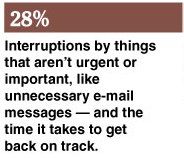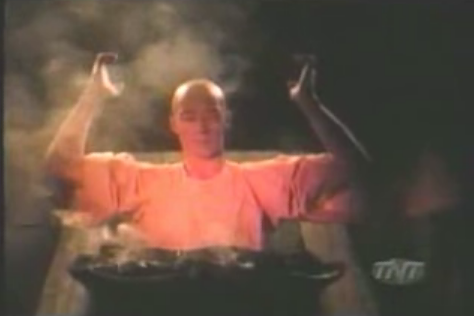Merlin’s weekly podcast with Dan Benjamin. We talk about creativity, independence, and making things you love.
workingGoogle Docs Adds Over 300 New TemplatesMerlin Mann | Jul 17 2008
My favorites are in the eclectic "Miscellaneous" section, where you'll find templates for athletes, parents, wedding or event planners, wine nerds, screenwriters -- even "animal guardians". read more »9 Comments
POSTED IN:
Ira Glass on Working Through the SuckMerlin Mann | Jul 7 2008YouTube - Ira Glass on Storytelling #3 Video featuring terrific advice from This American Life’s Ira Glass on having the tenacity to get better at the creative work you’re passionate about — even through the times when you know what you’re making isn't as good as you'd like. read more »POSTED IN:
NYT: Businesses Fight the Email Monster They Helped CreateMerlin Mann | Jun 14 2008Lost in E-Mail, Tech Firms Face Self-Made Beast - NYTimes.com Is Information Overload a Billion Drag on the Economy? - Bits - Technology - New York Times Blog If you've seen the video of my Inbox Zero talk at Google, you may recall the moment when a few attendees start mentioning the hundreds of internal email messages they receive (and send) in a given day. I still remember, because I almost fainted. Whenever I hear these and similar stories, the same question always comes to mind: "What does a company get out of its employees spending half their day using an email program?" Well, apparently, it's a question a lot of people are starting to ask. Including Google. read more »POSTED IN:
Topless meetings for team focus?Merlin Mann | Mar 25 2008When it's hard to stay focused, try going 'topless' to meetings - San Jose Mercury News Our good pals over at Adaptive Path have been experimenting with banning laptops and other communication devices in meetings (something I've supported in the past). From today's Mercury News:
[via Dan Saffer] The Question to YouHas your team tried some version of topless meetings? How did it work for you? Anybody tried it and given up? How did the meetings change without the toys being on? POSTED IN:
Vox Pop: Patterns for email as work conversation?Merlin Mann | Mar 12 2008Inbox Zero is a system and philosophy that most benefits people who are overwhelmed by a high-volume of mystery meat email. The system works because it's stupid-simple, and the real art comes out of getting fast and ruthless at identifying requests for your time and attention that must be acknowledged or completed vs. the vast majority of stuff that needs very light attention (or can just get deleted). But, not so fast -- what if, instead, you're receiving a high volume of easily identifiable messages? And what if your main "action" is reading, digesting, and then contributing? That's a bit trickier, as I have learned. Every time I give the Inbox Zero talk to a tech-heavy group -- and most especially when I talk with engineers -- there's pushback on a couple issues. First, a lot of techies say they love it when everything gets routed through email, and second, they think an Inbox-Zero-type methodology isn't particularly useful for the type of communication that they get all day long. And that's conversations. Lots of conversations. For many tech folks, email is the ideal and preferred way to avoid meetings and pointless flights. It's where they discuss features, debate implementation, and argue over the best solution to a problem. And that's how they like it. Some companies I visit with tell me they take pride in generating over 1000 person-messages each day. That's their culture, and love it or leave it. This doesn't mean there's not room for improvement, but of course it's a valid and very real way to work. Do stay tuned after the jump for your chance to join the conversation with comments and tips for managing conversational email, but first here's my observations on a few patterns that seem to work for a high volume of conversation based email: read more »POSTED IN:
A Day Unplugged: Frenzied Blackberries vs. Kwai Chang Caine?Merlin Mann | Mar 3 2008I Need a Virtual Break. No, Really. - New York Times In yesterday's New York Times, Mark Bittman wrote an entertaining and thoughtful article about realizing that his need to stay wired, in-touch, and updated was really starting to eat into him. His headslap moment came on an international flight, as he realizes "the only other place I could escape was in my sleep." He goes on to talk about the difficulty of maintaining even a single day of "Sabbath" from electronic communication and media:
But, eventually, he settles in and starts to enjoy things that would never appear on his radar screen on a wired day:
Eventually (natch), he returns to the wired world. So it goes. I liked that this piece was written from a personal perspective, which, to my mind, is the best (and, often, only) place to start any kind of experiment around hacking time and attention. And, I do really like the idea of periodically accepting (enforcing?) days without media and wires. Truly, you'll never realize how difficult this can be until you really make it happen. But, as Bittman notes, once you get over the initial crash, you can see a striking contrast in what your life could look like. Good stuff. But, like a lot of pieces on wired overstimulation, this one comes close to conflating the axis of "work" with the axis of "electronic media." Which, in my opinion, is an unwholesome confusion to abide, even just in appearance -- especially since it could be seen as blaming inert matter for our problems, while allowing us addicts (and the culture we've permitted ourselves to grow accustomed to) to get off way too easy. read more »POSTED IN:
|
|
| EXPLORE 43Folders | THE GOOD STUFF |



